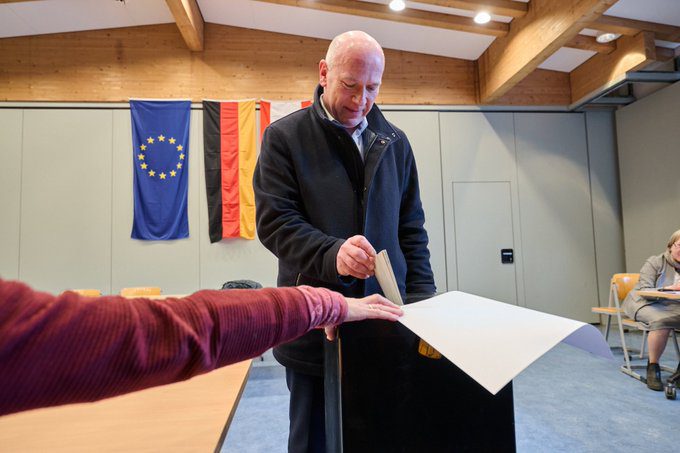
The centre-right Christian Democratic Union (CDU) made huge gains this week in the Berlin state elections on February 12th, indicating serious political change is coming to the famously left-liberal city.
The elections mark the end of two decades of Berlin’s electoral domination by the Social Democratic Party of Germany (SPD), which has led every election since 2001. According to the results, the CDU jumped from 17% in the 2021 polls to 28% this Sunday, a swing of over 10%.
The vote is a court-ordered repeat election, following irregularities and poor organisation in the 2021 vote.
It’s a surprising result, given Berlin’s reputation as a ‘progressive’ city. Often regarded as a diverse cosmopolitan hub, Germany’s capital is considered a European Mecca for those drawn to the artistic and ‘alternative lifestyles.’
It’s quite possible that blame for the electoral shift lands on the shoulders of the previous coalition. The alliance of the SPD, the Greens, and the hard-left Die Linke, known as the red-green-red coalition, has governed the capital city since 2016.
According to Celine, a young Berlin resident, “this is a really shocking result … It definitely shows that many defiant voters decided to repay the red-green-red coalition for a chaotic previous term.” However, she does not believe that the vote reflects any deeper cultural shift:
I’m sure that a lot of the people who voted for the CDU don’t actually support the party’s agenda or values. I think one major issue the government has to tackle is the housing market and I don’t see the CDU having any good or better social agenda on this. They would definitely make it worse.
Paul Couque-Castelnovo, a CDU representative in the eastern district of Lichtenberg, agreed that “the campaign in Berlin was dominated by general dissatisfaction with a partly dysfunctional administration.” However, he invoked a number of other issues, “such as the question of the further construction of the A100 city motorway, or the redesignation of roads for pedestrian and bicycle traffic.” He also cited the New Year’s riots, which for the CDU raised questions about security and migration.
One of the more interesting results, as pointed out by the Berliner Morgenpost, is that the political division of the city looks to have moved on from its historical East-West division. The new split is one between the inner and outer cities: the former voting for the Left, the latter for the Right.
Yet, Couque-Castelnovo is ambivalent toward such categorical divisions of Berlin voters:
It’s hard to say. The districts in the west and east still have their own socio-cultural structure with district political priorities. But if you look at the electoral map, you can see a clear difference between the centre of Berlin (within the S-Bahn ring) and the outer districts. This is mainly due to the policy of the current senate, which has too often made its own clientele policy for the ‘hip’ inner-city districts instead of focusing on the problems of all Berliners. Especially in the east, however, the CDU stands for a different, citizen-oriented policy that tries to solve the everyday problems of all citizens.
Meanwhile, the Alternative for Germany party (AfD) regained 4 seats to rise to a total of 17, but has yet to recover the initial 25-seat breakthrough they achieved in 2016. Markus Buchheit, AfD MEP, told The European Conservative:
Sometimes the victory margin in sport comes by large strides and sometimes it’s a matter of slowly inching forward. As in that famous Al Pacino locker room speech in Any Given Sunday, this election was a matter of moving forward ‘inch by inch.’
AfD needs to stick to a strong and clear agenda of meeting people’s needs for security, peace, and prosperity. We don’t need to get caught up in ideology-driven disagreements. We need to go on meeting people where they are and taking them where they want to go … for a better Germany.
The question is now what the city’s next governing coalition will be. Although weakened, the incumbent red-green-red coalition still holds enough seats to govern. As a result, while the CDU is the largest party, it will need to accept forming a coalition with either the SPD or the Greens in order to govern.
While the possibility of state-level coalitions between the CDU and AfD is an increasing possibility in much of Eastern Germany, the parties lack the seats in Berlin—a situation not likely to change since no parties from the former red-green-red coalition are likely to defect.
Petr Bystron, MP for AfD, was more sceptical towards the centre-right, saying
Berlin’s election is a clear indication that the German people want a change. The problem is that leftist media has demonised the AfD to such an extent, that the current CDU does not have the [nerve] to rule with it.
While still a local election, it comes at a time when Germans’ trust in state institutions has fallen sharply, and concerns over issues such as migration have risen. These results from Berlin’s election only raise further questions about the future direction of Germany.
